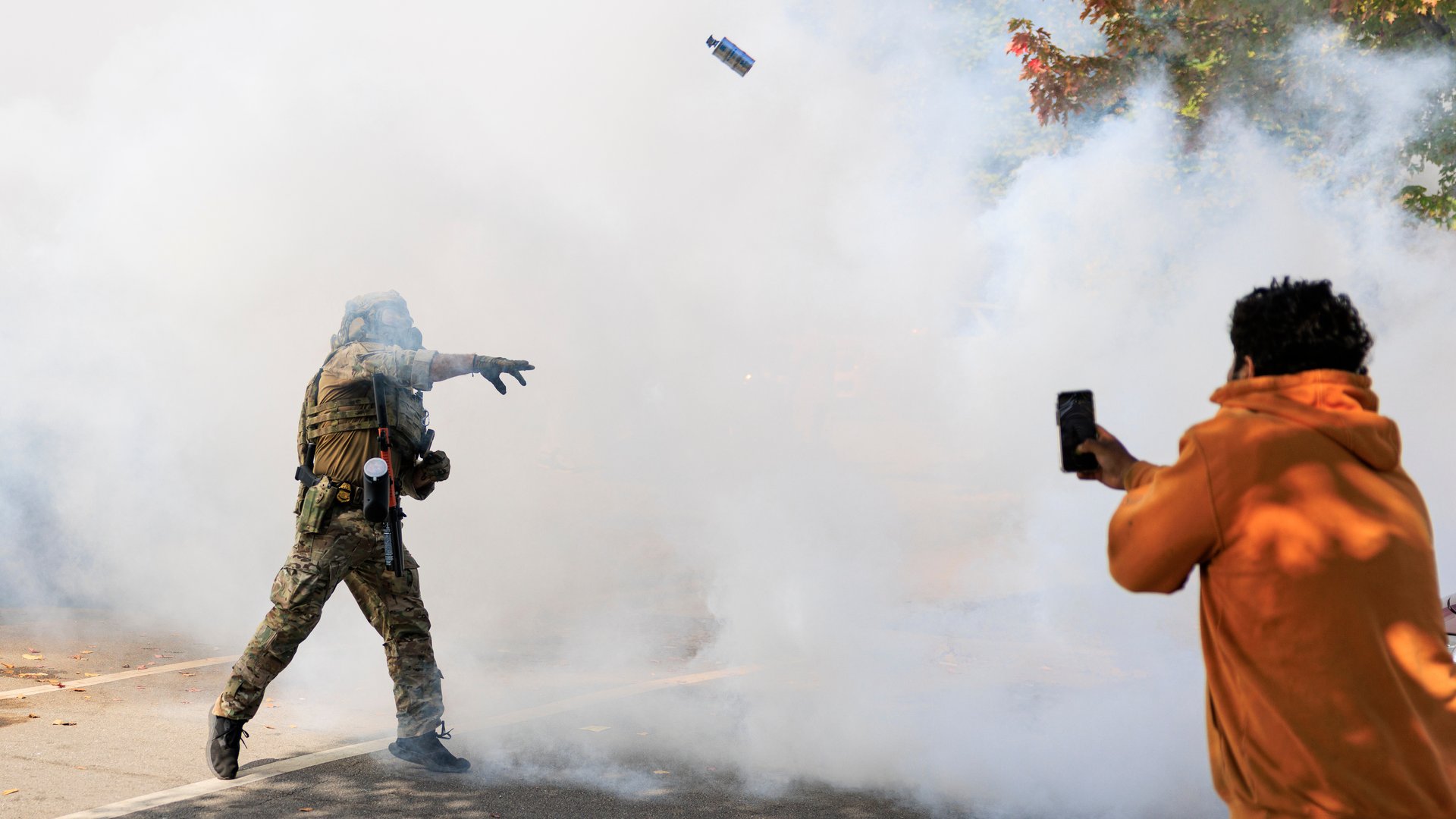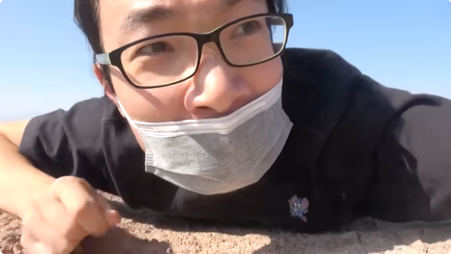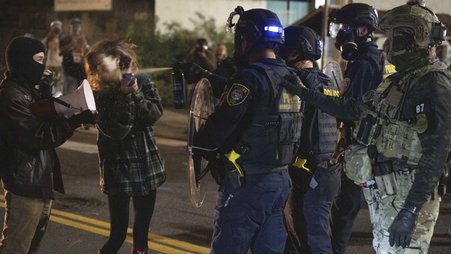Dear Friend of Press Freedom,
It’s been two weeks since Atlanta journalist Mario Guevara was deported and 207 days since Rümeysa Öztürk was arrested for co-writing an op-ed. Read on for more about this weekend’s planned protests, actions you can take to protect journalists, and events you can catch us at this month.
When the law’s on your side but ICE doesn’t care
As protesters paint signs for another round of “No Kings” demonstrations this Saturday, journalists are getting ready in their own way: charging camera batteries, notifying emergency contacts, and rinsing old tear gas residue off their shatter-resistant goggles.
Two cities — Los Angeles, California, and Chicago, Illinois — are expecting their largest protests since federal judges issued multiple rulings exempting the press from general dispersal orders and restricting law enforcement’s use of “less lethal” munitions.
Those are big wins for journalists, but only if they know how to use them. Our new deputy director of advocacy at Freedom of the Press Foundation (FPF), Adam Rose, wrote about how journalists can prepare for the weekend. Read more here.
Administration ignores flotilla abuses
Three U.S. journalists have been abducted from aid flotillas bound for Gaza and detained by Israel. All three reported experiencing or witnessing abuse and even torture.
Photojournalist Noa Avishag Schnall recalled, “I was hung from the metal shackles on my wrists and ankles and beaten in the stomach, back, face, ear and skull by a group of men and women guards, one of whom sat on my neck and face, blocking my airways … Our cell was awoken with threats of rape.”
Jewish Currents reporter Emily Wilder said she “announced … ‘I’m a journalist, I’m press.’ The woman to my left hissed, ‘We don’t give a fuck,’ and the other dug her nails into my scalp and pulled me by my hair across the port.”
In normal times, this would be a major scandal. We joined Defending Rights & Dissent and others in a letter to Secretary of State Marco Rubio explaining what should be obvious — the U.S. shouldn’t sit silently as its ally assaults its journalists. Read it here.
First rule of Qatari jets? Don’t talk about Qatari jets
We sued the Trump administration for refusing to share its legal rationale for approving the president’s acceptance of a $400 million jet from the Qatari government, despite the Constitution saying he can’t do that. Now the administration wants to strike our complaint, claiming the background discussion of the gifted jet is “impertinent” and “scandalous.”
That’s rich, especially weeks after the president’s frivolous defamation lawsuit against The New York Times got dismissed for rambling on about how he was once on WrestleMania and “The Fresh Prince of Bel-Air” (he’s since filed an amended complaint).
Public records expert: ‘We can do better’
If fewer newspapers exist to request public records, does the government become less transparent? That’s the question at the heart of “Dark Deserts,” a new research paper by David Cuillier of the Freedom of Information Project at the Brechner Center for Advancement of the First Amendment and law student Brett Posner-Ferdman.
Cuillier told us about what he and Posner-Ferdman found and what it means for the public’s right to know. Read the interview here.
Standing with student journalists
Last week we told you about the lawsuit filed by The Stanford Daily to stop the Trump administration’s unconstitutional and appalling push to deport foreign students who say or write things it doesn’t like.
This week we joined the American Civil Liberties Union of Northern California, the First Amendment Coalition, and others in a legal brief in support of that important lawsuit.
Congressional secrecy bill advances
The Senate passed Sens. Ted Cruz and Amy Klobuchar’s bill to protect themselves — but not you — from data broker abuses and otherwise allow federal lawmakers to censor the internet.
FPF’s Caitlin Vogus wrote for The Dallas Morning News about how the bill threatens journalism — for example, by stifling reporting on its co-sponsor vacationing while his constituents endure natural disasters. Read more here.
What we're reading
Pentagon reporters have now turned in their badges – but plan to keep reporting
Journalists told The Guardian, “the restrictions won’t stop the work, with some even saying they plan to take a more aggressive tack.” Good. The policy is highly unconstitutional, but it’s an opportunity to omit Pentagon lies and spin from reporting.
LAPD wants judge to lift an order restricting use of force against the press
Rose, who is also press rights chair for the LA Press Club, said that “Instead of holding the department accountable, the city is spending even more money to hire an outside law firm so they can effectively beg a judge for permission to keep assaulting journalists for just doing their job.”
Facebook suspends popular Chicago ICE-sightings group at Trump administration’s request
So much for Facebook’s renewed commitment to free speech. And so much for this administration’s condemnation of social media censorship.
Victory: Federal court halts Texas’ ‘no First Amendment after dark’ campus speech ban
A federal court blocked a ridiculous law that banned almost all speech on public college campuses in Texas at night, including student journalism. As we explained in the Houston Chronicle, free speech does not have a curfew.
Upcoming FPF events
Oct. 22: Join FPF’s Adam Rose and others on Oct. 22 at 3 p.m. EDT for an online conversation hosted by the American Constitution Society about the impact of federal law enforcement violence on your First Amendment rights. Register here.
Oct. 24: If you’re in Chicago and fortunate enough to not have to hide from ICE invaders, come to Northwestern for a panel on Oct. 24 at 10 a.m. CT featuring FPF Advocacy Director Seth Stern. We’ll discuss the numerous digital and physical challenges journalists are facing. Register here.
Oct. 29: FPF’s Caitlin Vogus will join an online panel of experts to break down how the Federal Communications Commission and Federal Trade Commission are targeting journalists and the First Amendment and how to fight back. Register here for the Center for Democracy and Technology’s Future of Speech 2025, “Working the Refs” panel on Oct. 29 at 12:10 p.m. EDT.
That same day, join us for a conversation about making public records-based reporting free, featuring Vogus as well as our Chair on Government Secrecy Lauren Harper, in conversation with leadership at Wired and 404 Media, including Wired global editorial director and FPF board member Katie Drummond. The event starts at 2 p.m. EDT; RSVP on Zoom here.
Oct. 30: Join an online discussion on Oct. 30 at 1 p.m. EDT about digital safety and legal rights for journalists reporting on immigration in the U.S., featuring FPF Director of Digital Security Harlo Holmes and several other experts from the U.S. Journalist Assistance Network. Register here.





